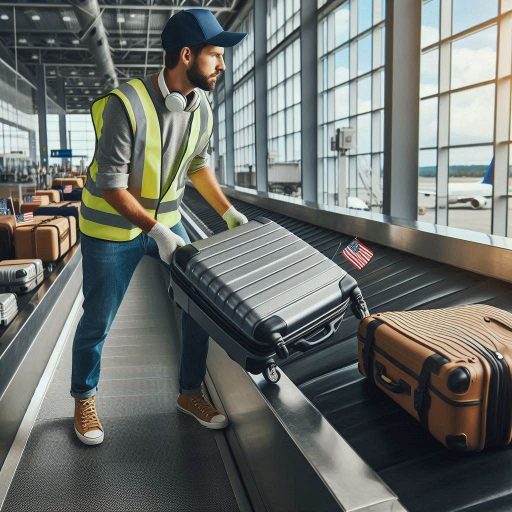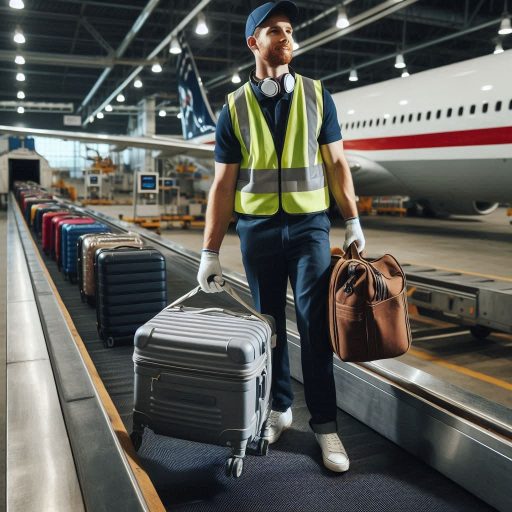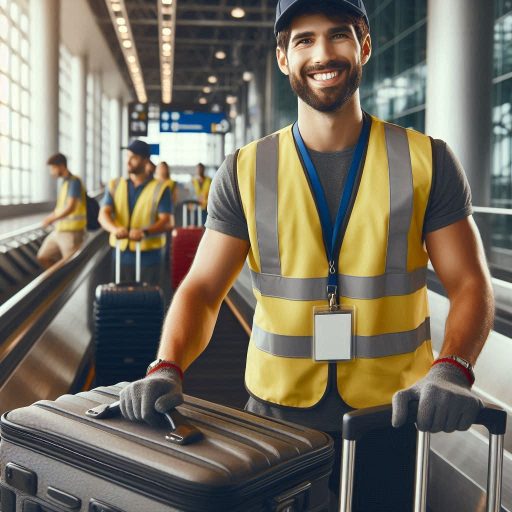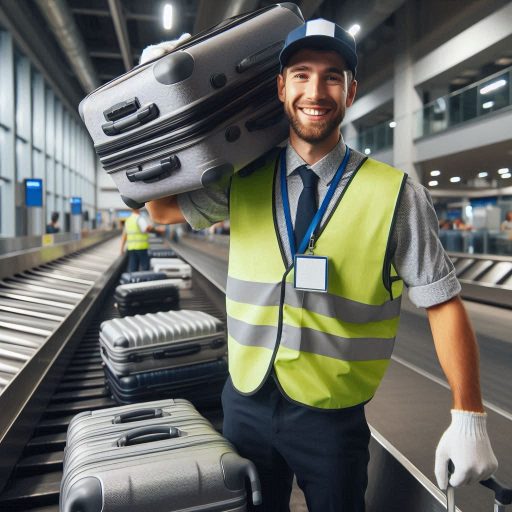Introduction
Understanding airline policies is crucial for baggage handlers in their daily operations.
These policies provide guidelines on handling luggage and ensuring safety.
Knowledge of policies helps handlers comply with regulations and maintain efficiency.
Proper adherence to airline policies minimizes the risk of accidents and damages.
Baggage handlers must know the specific procedures for loading, unloading, and transporting luggage.
Understanding weight limits and fragile item handling is essential for avoiding mishaps.
These policies significantly impact the overall functioning of an airline.
When baggage handlers follow established guidelines, the workflow remains smooth and organized.
This organization reduces delays and enhances passenger satisfaction.
On-time luggage delivery fosters trust and loyalty among travelers.
Additionally, adhering to policies ensures compliance with industry regulations.
This compliance is essential for maintaining operational licenses and avoiding penalties.
Airlines benefit from clear and effective policies that promote safety and efficiency.
These policies also help in training new employees, ensuring they understand their responsibilities from the start.
Understanding airline policies is vital for baggage handlers.
Their knowledge impacts the airline’s operational efficiency and contributes to a positive passenger experience.
By following these guidelines, handlers help ensure the airline runs smoothly and effectively.
Training requirements for baggage handlers
Certification Programs and Courses That Baggage Handlers Must Complete
Baggage handlers must complete specific certification programs to ensure they meet industry standards.
These programs cover essential safety procedures and equipment handling.
Training often includes learning about hazardous materials and emergency response protocols.
Many airlines require baggage handlers to complete these courses before starting work.
Various organizations offer training programs for baggage handlers.
The International Air Transport Association (IATA) provides comprehensive courses focused on ground operations.
These courses teach best practices and industry regulations that handlers must follow.
Completing these programs helps handlers perform their duties safely and efficiently.
Additionally, airlines may offer their own in-house training programs.
These programs often focus on the airline’s specific policies and procedures.
Baggage handlers learn about the equipment they will use and the protocols for loading and unloading luggage.
Certification from these programs demonstrates that handlers are qualified for their roles.
Courses on customer service and communication skills are also beneficial.
Baggage handlers often interact with passengers, so effective communication is vital.
Training in this area helps them address passenger concerns and provide assistance when needed.
Importance of Ongoing Training to Stay Up-to-Date with Airline Policies
Ongoing training is crucial for baggage handlers to stay updated on airline policies.
The airline industry constantly evolves due to new regulations and technologies.
Regular training ensures that handlers remain informed about these changes and their implications.
Airlines often implement new safety protocols or equipment, which requires additional training.
Handlers must understand how to operate new machinery and follow updated procedures.
Ongoing training helps them adapt quickly to these changes, ensuring smooth operations.
Moreover, regular refresher courses reinforce existing knowledge and skills.
These courses help prevent complacency and maintain high safety standards.
Baggage handlers who participate in ongoing training are more confident and competent in their roles.
Additionally, changes in regulations regarding baggage handling require updated training.
For example, airlines may revise policies regarding oversized or fragile items.
Handlers need to be aware of these changes to avoid issues during handling.
Staying informed helps prevent damage to luggage and improves customer satisfaction.
Workshops and seminars also offer opportunities for professional development.
These sessions often cover industry trends and best practices in baggage handling.
Engaging with peers allows handlers to share experiences and learn from each other.
Networking with professionals can enhance their skills and career prospects.
Baggage handlers must complete certification programs and ongoing training to excel in their roles.
These programs equip them with the necessary skills and knowledge to perform safely and efficiently.
Ongoing training ensures that they stay updated on airline policies and industry changes.
By prioritizing training and development, baggage handlers can enhance their performance and contribute to a positive passenger experience.
This commitment to learning helps ensure the smooth operation of airline services and maintains high safety standards.
Safety regulations for handling baggage
Proper Lifting Techniques to Prevent Injuries
Understanding airline policies for baggage handlers starts with proper lifting techniques.
Handlers frequently lift heavy luggage, which can lead to injuries if done incorrectly.
Learning how to lift safely is crucial for long-term health and job performance.
Handlers should always bend at the knees when lifting heavy items.
This technique minimizes strain on the back and promotes better posture.
Keeping the load close to the body also helps maintain balance and reduces injury risks.
Employers should provide training sessions on safe lifting methods.
Regular training ensures that handlers remain aware of the best practices.
Additionally, practicing these techniques helps reinforce good habits in the workplace.
When lifting awkwardly shaped or oversized items, handlers should seek assistance.
Working with a partner can prevent accidents and injuries.
Teamwork is essential in maintaining safety while managing heavy or bulky luggage.
Furthermore, baggage handlers must pay attention to their physical limits.
If a bag feels too heavy, it is crucial to ask for help.
Knowing one’s limits is vital for preventing injuries in a physically demanding job.
Using tools such as trolleys and conveyor belts can also reduce physical strain.
Handlers should utilize these tools whenever possible to minimize the risk of injury.
Properly maintaining equipment also ensures it functions effectively, aiding in safe lifting practices.
Protocols for Hazardous Materials and Dangerous Goods
Airline policies also include strict protocols for handling hazardous materials and dangerous goods.
Baggage handlers must recognize and respond to potential hazards to ensure safety.
Understanding these protocols is essential for preventing accidents and injuries.
Handlers should undergo training to identify hazardous materials.
Items such as flammable liquids or explosive devices require special handling.
Being aware of the potential dangers helps prevent serious incidents.
Airlines often provide labels and documentation for hazardous items.
Handlers must read and understand these labels to ensure safe handling.
Failure to comply with these protocols can lead to dangerous situations and legal repercussions.
In addition, baggage handlers should know the proper procedures for reporting hazardous materials.
If a handler encounters suspicious or improperly packaged items, they must report it immediately.
Prompt reporting can prevent accidents and ensure the safety of all staff and passengers.
Moreover, wearing appropriate personal protective equipment (PPE) is essential when handling hazardous materials.
Airlines must provide PPE such as gloves, masks, and goggles to protect handlers.
Using PPE effectively reduces the risk of exposure to harmful substances.
Furthermore, airlines often conduct regular safety drills and training sessions.
These sessions help reinforce the importance of following protocols for hazardous materials.
Continuous education ensures that all baggage handlers are well-informed and prepared.
In review, understanding airline policies for baggage handlers is essential for maintaining safety.
Proper lifting techniques play a crucial role in preventing injuries.
Baggage handlers must be trained to lift safely and know their physical limits.
Additionally, protocols for hazardous materials ensure that handlers manage potential risks effectively.
Recognizing hazardous items, using PPE, and reporting issues are critical components of safety.
By adhering to these policies, baggage handlers contribute to a safer working environment for themselves and their colleagues.
Read: Understanding Nail Disorders: A Technician’s Guide
Weight and size restrictions for baggage
Limitations on the Weight and Dimensions of Checked Luggage
Airlines impose limitations on the weight and dimensions of checked luggage to ensure safety and efficiency.
Each airline has specific guidelines regarding maximum weight, size, and the number of bags.
Typically, the weight limit for checked luggage ranges from 50 to 70 pounds, depending on the airline and destination.
Dimension restrictions also apply, usually specifying maximum linear dimensions of 62 inches (length + width + height).
Exceeding these limits can lead to additional fees or the refusal of luggage altogether.
These policies help maintain order during the boarding process and protect airline equipment.
Passengers often overlook these limitations, leading to last-minute adjustments at check-in.
When bags exceed the specified limits, passengers must either repack their belongings or pay additional fees.
Understanding these policies helps passengers avoid frustration and delays.
Airlines regularly update their baggage policies, which can vary by season or destination.
Baggage handlers must stay informed about these changes to manage luggage effectively.
They play a critical role in ensuring that checked baggage adheres to airline regulations.
How Baggage Handlers Ensure Compliance with These Restrictions
Baggage handlers are responsible for enforcing airline baggage policies.
They check luggage at the ticket counter and ensure compliance with weight and dimension restrictions.
Handlers use digital scales and measuring devices to confirm that each bag meets the airline’s criteria.
When a bag exceeds the weight limit, handlers inform the passenger of the situation.
They provide options for repacking or paying additional fees for overweight luggage.
By maintaining clear communication, handlers help facilitate a smooth check-in process for travelers.
In addition to checking luggage at the counter, baggage handlers also monitor items during the loading process.
They maintain an organized system to ensure that each bag goes to its designated flight.
This organization prevents mix-ups and minimizes delays in baggage retrieval upon arrival.
Handlers also collaborate with ticket agents and ground staff to manage baggage compliance effectively.
When issues arise, they work together to resolve them quickly, ensuring that passengers receive timely assistance.
This teamwork enhances the overall efficiency of baggage handling operations.
Furthermore, baggage handlers play a crucial role in identifying oversized items.
When handlers notice luggage that exceeds dimension limits, they follow protocols to address the situation.
They may flag oversized bags for special handling or redirect them to different loading areas.
By adhering to these processes, baggage handlers help maintain safety and efficiency in airline operations.
Their attention to detail ensures that passengers’ luggage complies with airline policies.
This diligence reduces the risk of complications during loading and unloading.
In the end, understanding airline policies for baggage handlers is essential for effective operations.
Limitations on weight and dimensions of checked luggage help maintain order and safety.
Read: How to Deal with Pet Grooming Allergies
Procedures for handling lost or damaged luggage
Steps Taken by Baggage Handlers to Locate Missing Bags
When passengers report missing bags, baggage handlers follow specific steps to locate them.
First, they gather essential information from the passenger.
This information includes the passenger’s name, flight number, and description of the luggage.
Next, handlers check the baggage tracking system.
This system records the location and status of all checked bags.
By accessing this information, handlers can determine if the bag is delayed or misrouted.
If the bag is not in the tracking system, handlers conduct a physical search.
They inspect the baggage claim area, cargo holds, and connecting flights.
This thorough search helps ensure that all possible locations are checked.
Handlers also communicate with other airline staff during the search.
They coordinate with ground crews and airport personnel to expand their search efforts.
This teamwork enhances the chances of locating the missing bag quickly.
Once the bag is located, handlers inform the passenger about its status.
They provide updates on when and where the bag will be delivered.
Keeping passengers informed helps alleviate their concerns and improves customer service.
In some cases, if a bag cannot be found immediately, handlers file a report.
This report documents the missing bag’s details and initiates further investigation.
Passengers receive a copy of this report, which includes a reference number for follow-up.
Protocol for Reporting and Documenting Any Damage to Luggage
Baggage handlers must adhere to strict protocols when reporting and documenting damaged luggage.
Upon discovering damage, handlers first assess the extent of the issue.
They examine the luggage and take photographs to document any visible damages.
Next, they inform the passenger about the damage and provide assistance.
This may include offering to repair the luggage or issuing a claim form.
Open communication is vital to maintain customer satisfaction in these situations.
Handlers then complete a damage report.
This report includes details about the luggage, the nature of the damage, and the circumstances surrounding it.
Accurate documentation is essential for processing claims efficiently.
After filing the report, handlers submit it to the appropriate department within the airline.
This step ensures that the damage is logged and investigated properly.
Airlines often have specific timelines for addressing damage claims, so timely reporting is crucial.
Passengers receive a copy of the damage report along with instructions on how to proceed.
They may be required to submit receipts for repairs or replacement.
Clear guidelines help passengers understand the next steps in the claims process.
In essence, baggage handlers play a vital role in locating missing bags and managing damaged luggage.
They follow specific steps to ensure thorough searches and effective communication with passengers.
Additionally, adhering to protocols for reporting and documenting damage is essential for providing excellent customer service.
By understanding these processes, baggage handlers can enhance the overall travel experience for passengers while maintaining the airline’s reputation.
Read: Creating a Comfortable Atmosphere in Your Nail Salon
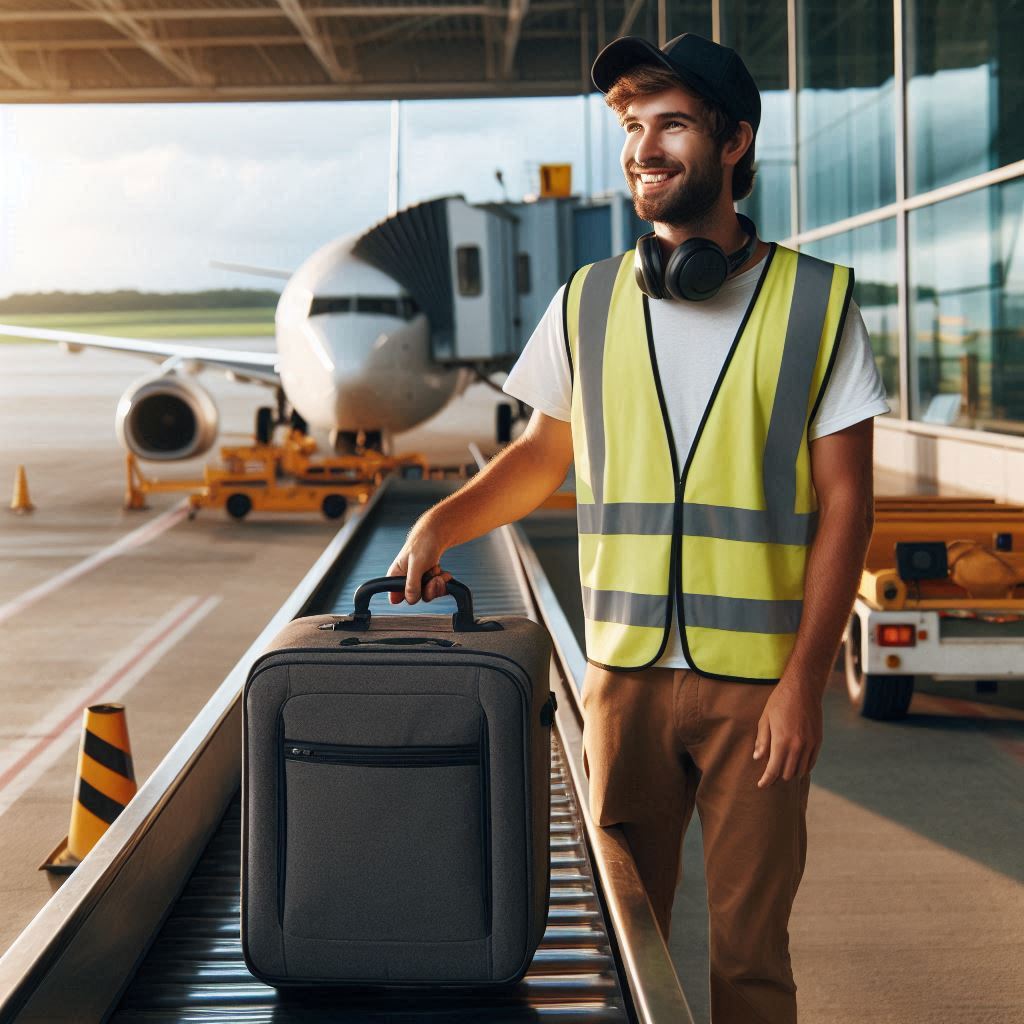
Security measures for baggage handling
Screening Processes for Checked Luggage
Understanding the screening processes for checked luggage is essential for baggage handlers.
Each airline has specific protocols to ensure passenger safety.
These screening processes help identify potentially dangerous items before boarding.
Baggage handlers must follow strict guidelines for handling checked luggage.
Before loading bags onto the aircraft, they ensure each bag undergoes a thorough inspection.
Security personnel typically perform this inspection using advanced screening technology.
X-ray machines are common tools used to screen checked luggage.
These machines allow security staff to examine the contents without opening bags.
Trained personnel analyze the images to identify any suspicious items.
If any concerns arise, they may open the bag for a manual check.
Baggage handlers should be aware of the types of items that require special attention.
Prohibited items include weapons, explosives, and flammable materials.
Familiarizing themselves with these guidelines helps handlers understand what to look for during the screening process.
Collaboration between baggage handlers and security staff is crucial.
Effective communication ensures that all suspicious items are reported immediately.
This teamwork helps maintain a safe environment for passengers and crew.
Steps Taken to Prevent Theft or Smuggling of Illegal Items
Airlines implement several steps to prevent theft or smuggling of illegal items.
Security measures are essential in maintaining the integrity of checked luggage.
Baggage handlers play a vital role in these efforts.
One primary method involves the use of tamper-proof seals.
These seals are applied to checked luggage after screening, indicating that bags have not been opened.
If a seal is broken, it raises immediate concerns, prompting further investigation.
Regular training on security protocols helps baggage handlers recognize potential threats.
They learn to identify suspicious behavior and report it to supervisors.
This proactive approach allows for swift action when necessary.
Airlines also conduct background checks on baggage handling staff.
This process helps ensure that employees have trustworthy records and are fit for the role.
Having a reliable team reduces the risk of internal theft or collusion.
Additionally, surveillance cameras are installed in baggage handling areas.
These cameras monitor activities and provide a visual record of interactions with checked luggage.
They serve as a deterrent to theft and help identify suspicious behavior.
Routine audits and inspections are conducted to assess compliance with security protocols.
These assessments ensure that staff adheres to policies and that procedures are effective.
Continuous improvement of security measures is vital for keeping air travel safe.
Baggage handlers should stay informed about any updates or changes to airline policies.
Familiarity with the latest security measures enhances their ability to respond effectively to potential issues.
Ongoing training and communication with management are crucial in this regard.
Read: How to Create a Pet-Friendly Grooming Environment
Communication protocols between baggage handlers and airline staff
Importance of Clear Communication
Clear communication is essential for baggage handlers in the airline industry.
It ensures efficiency and safety throughout the baggage handling process.
Miscommunication can lead to mistakes, delays, and potential safety hazards.
By sharing information effectively, baggage handlers can perform their tasks more smoothly.
Baggage handlers rely on accurate information to know which flights are arriving and departing.
Timely updates help them manage luggage effectively.
When handlers receive clear instructions, they can prioritize their tasks and work efficiently.
This clarity helps minimize wait times for passengers, improving overall service quality.
Moreover, communication between baggage handlers and other departments is crucial.
They must work closely with ramp agents, ticketing agents, and flight crews.
This collaboration ensures that luggage is loaded and unloaded safely and on time.
Effective communication fosters a sense of teamwork among all staff involved in the baggage handling process.
Additionally, clear communication contributes to workplace safety.
Baggage handlers need to be aware of any hazards on the tarmac.
Timely information about weather conditions, equipment malfunctions, or other safety issues is vital.
By staying informed, handlers can take necessary precautions and avoid accidents.
How Information Is Relayed Between Different Departments
Information is relayed between different departments within the airline through various channels.
One common method is through communication systems, such as two-way radios.
Baggage handlers often use these devices to receive real-time updates about flight schedules and luggage needs.
Additionally, airlines may employ software systems that track baggage movements.
These systems allow different departments to share information quickly and efficiently.
Baggage handlers can access data about arriving flights and their corresponding luggage requirements.
This access helps them prepare for incoming bags and ensure timely processing.
Team meetings also play a crucial role in relaying information.
Daily briefings help keep everyone updated on flight schedules and operational changes.
These meetings provide an opportunity for staff to ask questions and clarify any uncertainties.
Regular communication helps ensure that all team members are on the same page.
Moreover, written communication is essential in the airline industry.
Standard operating procedures (SOPs) are documented guidelines that detail baggage handling processes.
Baggage handlers must familiarize themselves with these documents to perform their duties correctly.
SOPs provide a reference point for best practices and ensure consistency in operations.
Collaboration with ramp agents is another critical aspect of information relay.
Baggage handlers need to coordinate with ramp staff to ensure smooth transitions between loading and unloading luggage.
This collaboration often involves exchanging verbal updates about flight statuses and luggage readiness.
Most importantly, clear communication is vital for baggage handlers in the airline industry.
It ensures efficiency and safety while facilitating collaboration between different departments.
Information is relayed through various methods, including radios, software systems, team meetings, and SOPs.
By prioritizing effective communication, airlines can enhance their baggage handling processes and improve overall service quality.
This emphasis on communication ultimately leads to a smoother experience for passengers and staff alike.
Policies for handling special items or fragile baggage
Procedures for Handling Delicate or Expensive Items
Airlines have specific procedures for handling delicate or expensive items.
These protocols ensure the safety and security of valuable luggage.
Baggage handlers must receive training on handling fragile items carefully.
Proper training minimizes the risk of damage during transit.
First, handlers should identify delicate items upon check-in.
Passengers often label fragile luggage with “Handle with Care” tags.
Handlers must pay special attention to these items.
They should ensure fragile luggage is loaded last and unloaded first.
This practice helps prevent damage from heavier bags.
Next, handlers must use appropriate equipment when moving delicate items.
They should use carts designed for transporting fragile luggage.
This equipment often includes padded compartments to protect items during transit.
Handlers must avoid stacking heavy bags on top of delicate items.
In addition, airlines may provide specialized packaging for fragile items.
Handlers should encourage passengers to use these materials when necessary.
Proper packaging significantly reduces the risk of damage.
Communication among team members is essential for ensuring delicate items are handled correctly.
Baggage handlers must inform each other when transferring fragile luggage.
This collaboration ensures everyone is aware of the special care required.
Protocol for Notifying Passengers of Special Handling Requirements
Airlines also have protocols for notifying passengers of special handling requirements.
Effective communication enhances the overall customer experience.
Baggage handlers play a crucial role in this process.
When passengers check in, staff must inform them about special handling procedures.
If a passenger has fragile or expensive items, staff should explain how those items will be handled.
Providing clear information reassures passengers that their belongings are safe.
Additionally, airlines often use special tags for baggage that requires extra care.
Handlers must ensure these tags are visible on the luggage.
This visibility alerts all team members to handle the bag with caution.
If any special requirements exist, such as temperature-sensitive items, handlers must communicate this information effectively.
They should notify relevant personnel in the cargo area about these items.
This ensures that appropriate measures are taken to maintain the required conditions.
Furthermore, airlines should encourage passengers to ask questions about special handling.
Baggage handlers should be prepared to provide answers and address any concerns.
Clear communication fosters trust between the airline and its customers.
In cases where damage occurs despite precautions, airlines must have procedures for notifying passengers.
Handlers should follow established protocols for reporting incidents.
This includes documenting the damage and informing the passenger as soon as possible.
Understanding airline policies for baggage handlers is essential for efficient operations.
Procedures for handling delicate or expensive items ensure their safety during transit.
Moreover, effective communication about special handling requirements enhances the passenger experience.
Baggage handlers must be trained in these procedures to protect valuable luggage and maintain customer trust.
By adhering to these protocols, airlines can create a safe and reliable environment for all travelers.
Consequences for violating airline policies
Disciplinary Actions for Baggage Handlers Who Fail to Follow Protocols
Airlines enforce strict policies to ensure safety and efficiency in operations.
Baggage handlers who fail to follow these protocols face disciplinary actions.
These actions may include verbal warnings, written reprimands, or even termination, depending on the severity of the violation.
Airlines maintain clear guidelines to ensure every employee understands the rules.
Each violation is taken seriously, especially those affecting safety and security.
For example, failing to secure luggage properly could lead to accidents or injuries.
Therefore, airlines have a zero-tolerance policy for negligence.
Repeated violations can lead to more severe consequences.
Baggage handlers may face mandatory retraining sessions to reinforce proper procedures.
This approach ensures that employees understand the importance of adhering to airline policies.
Consistent enforcement of disciplinary actions promotes a culture of accountability within the workforce.
Transform Your Career Today
Unlock a personalized career strategy that drives real results. Get tailored advice and a roadmap designed just for you.
Start NowImpact of Policy Violations on Airline Operations
Policy violations can significantly impact airline operations.
When baggage handlers do not follow protocols, it can lead to delays in loading and unloading luggage.
These delays can cause flights to leave late, disrupting the entire schedule.
Additionally, improper handling of luggage can lead to damaged or lost bags.
Such incidents create extra work for staff and decrease overall efficiency.
Airlines must then invest time and resources to resolve these issues.
This inefficiency can frustrate both employees and passengers alike.
Moreover, policy violations can strain relationships between airlines and airport authorities.
Consistent problems may lead to increased scrutiny from regulatory agencies.
Airlines may face fines or additional regulations if they fail to manage violations effectively.
Impact on Customer Satisfaction
Customer satisfaction often hinges on the efficiency of baggage handling.
Passengers expect their luggage to arrive on time and undamaged.
When baggage handlers violate policies, it can lead to negative customer experiences.
Delayed or lost luggage frustrates travelers and can tarnish an airline’s reputation.
In an industry where customer loyalty is crucial, maintaining a good reputation is essential.
Airlines must prioritize proper training and enforcement of protocols to ensure customer satisfaction.
Positive experiences lead to repeat business and favorable reviews, benefiting the airline’s bottom line.
When incidents occur due to policy violations, airlines must address them promptly.
Providing compensation for lost or damaged luggage can help appease frustrated customers.
However, relying on compensatory measures does not resolve the root issues.
In a nutshell, understanding airline policies for baggage handlers is crucial for maintaining safety and efficiency.
Disciplinary actions for protocol violations ensure accountability within the workforce.
Violations can significantly impact airline operations, leading to delays and increased scrutiny.
Ultimately, the effectiveness of baggage handlers directly affects customer satisfaction.
Airlines must prioritize proper adherence to policies to enhance operations and maintain a positive reputation among travelers.
Conclusion
Understanding airline policies is crucial for baggage handlers to perform their duties effectively.
These policies ensure the safe and efficient handling of luggage.
Handlers must comply with weight limits, safety protocols, and security procedures.
Adhering to airline policies prevents damage to luggage and reduces the risk of injury.
The significance of understanding these regulations cannot be overstated.
By following established guidelines, baggage handlers contribute to the smooth operation of airports.
Properly handling oversized or restricted items ensures that luggage is transported without delays.
Compliance also minimizes the chance of misrouting or losing luggage, which impacts customer satisfaction.
Baggage handlers must remain informed about any changes to airline policies.
Airlines often update regulations based on new security measures or technological advancements.
Staying updated helps handlers avoid errors and maintain a high standard of service.
Baggage handlers should take the initiative to review training materials regularly and ask questions when policies change.
Attending safety briefings and workshops ensures they stay compliant and perform their duties safely.
Staying informed is essential for maintaining the trust of passengers and airlines.
By understanding and following airline policies, baggage handlers can help ensure the smooth processing of luggage.
[E-Books for Sale]
The Big Book of 500 High-Paying Jobs in America: Unlock Your Earning Potential
$19.99 • 500 High-Paying Jobs • 330 pages
Explore 500 high-paying jobs in America and learn how to boost your career, earn more, and achieve success!
See All 500 High-Paying Jobs of this E-Book
1001 Professions Without a Degree: High-Paying American Jobs You Can Start Now
$19.99 • 1001 Professions Without a Degree • 174 pages
Discover 1001 high-paying jobs without a degree! Unlock career tips, skills, and success strategies for just $19.99!

